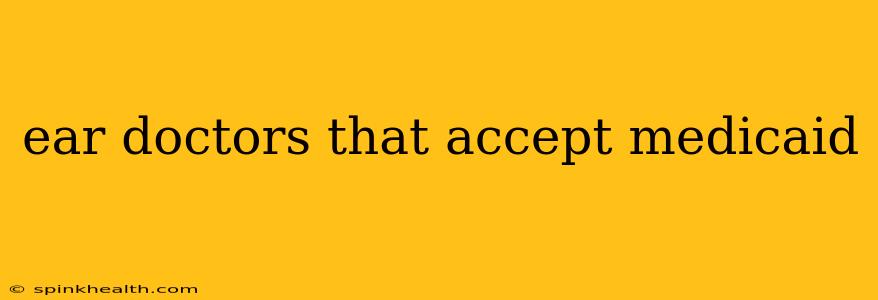Navigating the healthcare system can be challenging, especially when you're looking for specialized care like ear, nose, and throat (ENT) services and are relying on Medicaid for coverage. Finding an ear doctor who accepts Medicaid requires a bit of detective work, but it's absolutely achievable. Let's embark on this journey together, armed with strategies and information to make your search easier.
Imagine this: A persistent ringing in your ears, a sudden loss of hearing, or that nagging ear infection just won't go away. You need an expert, a skilled audiologist or ENT, but the cost of care is a significant concern. This guide is designed to help you overcome that hurdle and find the qualified help you deserve.
How to Find Ear Doctors Who Accept Medicaid
First, let's tackle the most direct approach. Many people start with online searches, but refining your search terms is key. Instead of simply typing "ear doctor," try these more specific phrases:
- "ENT doctor near me Medicaid"
- "Audiologist Medicaid [your city/state]"
- "Medicaid-accepted otolaryngologists [your zip code]"
These more targeted searches help filter out results from providers who don't participate in your state's Medicaid program.
Remember, the term "ENT" refers to an otolaryngologist, a doctor specializing in ear, nose, and throat conditions. Audiologists are healthcare professionals who specialize in hearing and balance disorders. Both can be vital in treating ear-related problems.
What Information Should I Provide When Calling?
Once you've compiled a list of potential providers, it's essential to confirm their Medicaid acceptance. When you call, be prepared to provide:
- Your Medicaid ID number: This will allow the office to verify your coverage quickly.
- Your insurance provider: Medicaid programs vary by state, so specifying your provider helps them confirm participation.
- The specific services you need: Are you looking for a routine hearing check-up, treatment for an infection, or a consultation for a more serious condition?
This upfront clarity streamlines the process and ensures you're scheduling with a provider capable of handling your specific needs.
What if I Can't Find an Ear Doctor Who Accepts Medicaid Directly?
Sometimes, despite your best efforts, finding a provider who directly accepts Medicaid can be challenging. Don't lose hope! Here are some alternative approaches:
- Contact your state's Medicaid agency: They can provide a list of participating providers in your area or offer guidance on finding alternative care options.
- Explore community health centers: These centers frequently offer discounted or subsidized care to individuals with limited financial resources, often including those with Medicaid.
- Check with local hospitals: Many hospitals have ENT departments and often have relationships with providers who work with Medicaid patients.
What are My Options if I Need Specialized Care?
Do all Medicaid plans cover hearing aids?
Medicaid coverage for hearing aids varies significantly by state and even by specific plan. Some states cover a portion of the cost, while others offer more comprehensive coverage. Contact your state's Medicaid office or your specific plan administrator to understand your coverage details.
What if I need surgery on my ears?
Medicaid generally covers medically necessary ear surgeries, but the specifics depend on the procedure, the approval process of your state's Medicaid program, and the participating physician. It's crucial to discuss the procedure and anticipated costs with your doctor and the Medicaid office in advance to determine your eligibility and out-of-pocket expenses.
Does Medicaid cover hearing tests?
Medicaid typically covers medically necessary hearing tests as part of the diagnosis and treatment of hearing problems. Again, the specific coverage will depend on your state’s plan.
Finding an ear doctor who accepts Medicaid is a crucial step in ensuring you receive the quality care you need. By utilizing these tips and strategies, you'll be well on your way to finding the right professional for your ear health needs. Remember to always verify coverage directly with the provider and your Medicaid agency.

